How to buy AIM shares
To buy AIM shares you need a stock broker that provides access to smaller-cap shares like Hargreaves Lansdown or interactive investor.
These are what we think are some of the best stock brokers for investing in AIM stocks and why:
- Hargreaves Lansdown – excellent market access, research pricing data and AIM company reports
- Interactive Investor – provide a fixed-fee investing account and access to the AIM market
- AJ Bell – a low-cost investment platform for investing in AIM shares
- IG – investing, CFD trading and financial spread betting on AIM stocks
- Spreadex – a smaller derivatives broker with great customer service for working orders in between the bid/offer spread (for more advanced larger traders).
What is the AIM stock market?
The Alternative Investment Market (AIM) hosts junior companies on the London Stock Exchange. Its main function is to provide a listing before companies grow and migrate to a main listing. In this guide, we cover how to buy AIM shares, what the AIM market is and some of the best AIM shares to follow.
AIM was set up in 1995 to promote investments in risky corporate ventures. Because of its less onerous listing requirements, many new startups choose to list there. Liquidity has grown as AIM shares can be included in stocks and shares ISAs, making them attractive tax-wise.
In 2024, the London Stock Exchange says that over £1.6bn has been raised on AIM, post IPO the average share price goes up by 47% with an average marrket cap of £101m.
AIM is not just for British firms, 24% of listed firms are international companies, and over the last 5 years 45% of all capital raised on European growth markets has been on the Alternative Investment Market.
Small-cap AIM stocks tend to be higher up on the risk spectrum. But they can be worth including in a Stocks or Shares ISA or SIPP due to their potential for outsized returns.
Best AIM stocks to buy
If you are looking for the best AIM stocks to buy for 2025, here are the top 10 constituents of AIM 100 by size with their all-time share price gain or loss:
- Jet 2 +: 4170%
- Greatland Gold: +582%
- Hutchmed China: +868%
- Burford Capital: 766%
- Globaldata: +99%
- Sigmaroc: -66%
- Fevertree: +457%
- Yellow Cake: 158%
- Pan African Resources: 1084%
- CVS Group: +446%
Is it worth investing in AIM Stocks?
Yes absolutely, AIM is home to some of the best growth stocks in the UK.
Gold producer Pan African Resources has delivered a +1,000% share price gain, benefitting from rising demand for gold. Premium mixer brand Fevertree shares are up +450% since its listing, although down sharply from their 2021 peak.
However, there are some disasters, digital ad firm Bidstack suffered a 99%+ collapse in share price after initial optimism.
Susannah Streeter, head of money and markets, Hargreaves Lansdown (one of the best brokers for buying small cap AIM listed stocks, that “Over the past three decades, the Alternative Investment Market has offered the possibility for investors to own a slice of high growth companies, and it remains one of the most successful markets for smaller growth firms in the world.”
AIM stock market statistics
If you’re interested in invest in AIM stocks here are five things you may no know and might surprise you:
- AIM celebrates its 30th anniversary on 19 June 2025, having launched in 1995 as a platform for high-growth, small-cap companies.
- The total number of companies listed on AIM has fallen by around 60% since its peak in 2007.
- The average market capitalisation of AIM-listed companies has nearly doubled since 2007, reaching £101 million in 2024.
- In 2023, AIM-listed companies contributed £68 billion to the UK economy and paid £5.4 billion in tax receipts.
- The Mansion House Accord, signed in 2024 by 17 pension providers, aims to unlock £50 billion in long-term investment, with part intended to support AIM-listed companies.
Buying AIM Shares with direct market access (DMA)
If you want better pricing, you can buy shares on the AIM market inside the bid/offer spread to get better pricing and reduce trading costs.
A reader has asked us:
If I want to invest in less liquid stocks (perhaps AIM listed securities) then the bid/ask spread may be wide (circa 10%) and without DMA I am required to cross the spread on entering a position and again when I exit. As such, I am not getting best-execution (because DMA brokers are able to achieve mid market fills) and I am giving away large percentages of investment returns. The market for the security could move up 10% and yet I would only be able to get out of my position flat.
More specifically the reader asked whether it’s possible for retail traders and investors to leave a limit with a broker, that is inside the bid-offer spread. Because as they point out in UK smaller companies and AIM-listed stocks, that spread can be as much as 10% of the share price.
This, of course, means that if an investor buys a stock with a 10% bid-offer spread they need to see to see the stock price rise by 10% before they break even.
Being able to place limit orders, and trade inside the bid-offer spread could reduce this break-even hurdle quite significantly.
What’s more, we were asked could limit orders be placed, if you are dealing for a stocks and shares ISA or SIPP account and can this be done electronically.
I put these questions to several of the UK’s leading investing platforms.
AJ Bell
The answer is that clients can leave limit orders, for example, Charlie Musson, Brand Director at AJ Bell told us limit orders can be placed for any UK share that is traded in sterling, and that they can be placed online, using either the website and mobile app or via the telephone.
Mr Musson also noted that a limit order can be placed with AJ Bell for ISA, pension and general investment accounts.
It’s even possible to place limits on international stocks with the broker, over the phone. Though certain restrictions around order size and liquidity in the underlying will apply here.
Limit orders at AJ Bell will not be automatically shown to the markets, and will instead be monitored in house, for a period of up to 90 days. Limits are transmitted to the market for execution if and when the bid offer price moves to a point where the order coud be executed, however an execution is not guaranteed.
At Hargreaves Lansdown clients can leave limit orders online, using the HL Live App and they can do so for all LSE-listed equities, including AIM stocks, ETFs and Investment Trusts.
Clients can choose from buy or sell limit order types, these orders are valid for 90 days. During this time they can be monitored within the pending orders section of the client’s online account.
I note though that these orders are minded internally, which means that the potential trade is not live on the order book, or left with a market maker, in a quote-driven stock, to be executed against their order flow.
Hargreaves Lansdown
Hargreaves Lansdown clients can also place limit orders over the telephone with the firm’s dealing team, in any security offered by the broker, that has a secondary market, subject to the counterparties in that market being willing to accept such an order.
These telephoned limit orders can be left on a good-for-the-day basis and clients can also specify ‘all or nothing, ’partial fill’ or ‘minimum fill’ requirements, when they place their order, phone dealing charges apply. Hargreaves will use their expertise and judgement to try and achieve a fill for the client. However, once again an execution is not guaranteed and Hargreaves Lansdown points out that it does not offer a DMA service.
DMA or Direct Market Access offers clients the ability to interact directly with the order books of the LSE SETS trading systems.
However, many retail brokers don’t operate a DMA service because of the structural, regulatory, technological and cost implications of doing so which are significant in each case.
Instead, retail brokers often have access to what’s known as the RSP, an online trading network run by the London Stock Exchange that allows market makers to compete for retail flow on a order by order basis.
Market makers on the RSP can choose to make price improvements in a given stock or stocks, whilst brokers can poll the RSP electronically with pricing requests, and if a limit order falls within a price improvement offered via the RSP, then that limit order should be executed.
interactive investor
At interactive investor, which is now owned by abrdn, clients can also place limit orders online, or over the telephone and this facility includes AIM-listed stocks.
However, that limit will not be made public or exposed to the market. Instead, it will be minded in-house until such time as it can be executed. II do make this point clear to clients when they submit limit orders.
Once again this is an important distinction, because it means that market makers in a security will be unaware of the limit orders existence and therefore will have no opportunity to fill it, even if they wanted to.
However, Interactive Investors are able to expose limit orders to the market on request, on a case-by-case basis, and clients will need to call the dealing team to initiate this, however, different dealing charges are likely to apply.
Getting a limit order executed will depend on a variety of factors such as the size of your order, the level of liquidity and activity in the security in question and even the relationship your broker’s dealing team have with the market makers in that stock.
In summary then limit orders can be placed with the large stock brokers, however there are limitations to this process, and investors need to be aware of what they are before they use this order type.
It also depends on the size of your account, the relationship you have with your broker and what sort of volume are trading.
The ultimate answer is that if you have an investing account, phone up your dealer and ask nicely. They may then phone up one of their market maker friends and see if they can work a bid below the offer for you.

Richard is the founder of the Good Money Guide (formerly Good Broker Guide), one of the original investment comparison sites established in 2015. With a career spanning two decades as a broker, he brings extensive expertise and knowledge to the financial landscape.
Having worked as a broker at Investors Intelligence and a multi-asset derivatives broker at MF Global (Man Financial), Richard has acquired substantial experience in the industry. His career began as a private client stockbroker at Walker Crips and Phillip Securities (now King and Shaxson), following internships on the NYMEX oil trading floor in New York and London IPE in 2001 and 2000.
Richard’s contributions and expertise have been recognized by respected publications such as The Sunday Times, BusinessInsider, Yahoo Finance, BusinessNews.org.uk, Master Investor, Wealth Briefing, iNews, and The FT, among many others.
Under Richard’s leadership, the Good Money Guide has evolved into a valuable destination for comprehensive information and expert guidance, specialising in trading, investment, and currency exchange. His commitment to delivering high-quality insights has solidified the Good Money Guide’s standing as a well-respected resource for both customers and industry colleagues.
To contact Richard, please see his Invesdaq profile.




